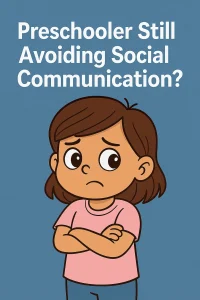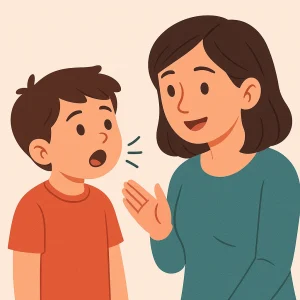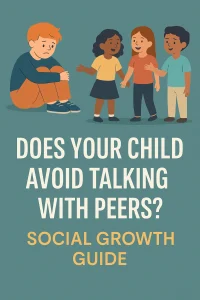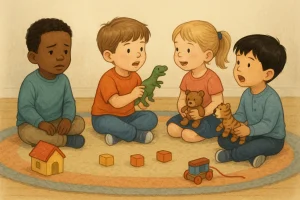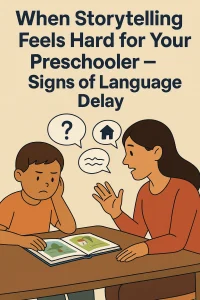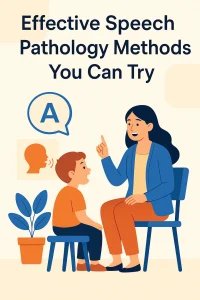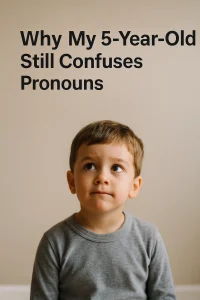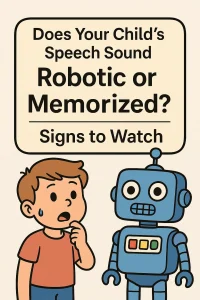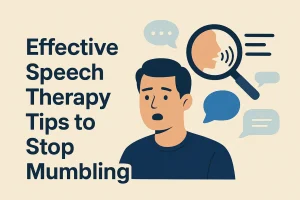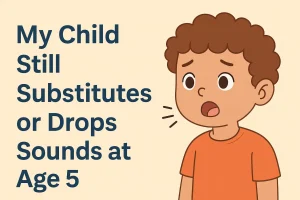When Speech Delays Could Point to Something Bigger
By Rajini D
Last Updated: July 25, 2025
It’s completely normal for parents to worry when their toddler isn’t talking as expected. Maybe your child says only a few words, or maybe they’re not speaking at all yet. While every child grows at their own pace, it’s also natural to wonder: Is this just a late talker… or is there something more going on?
Speech delay in toddlers is more common than many people think. Some children catch up on their own, while others may need a little extra support. The key is knowing when to be patient — and when it might be time to take a closer look.
Free Speech Help for Kids
Concerned about speech delays? Book a free consultation with our expert speech therapist and get guidance tailored to your child’s needs.
What is a Speech Delay in Toddlers?
A speech delay in toddlers means a child isn’t speaking as much or as clearly as most children their age. It doesn’t always mean something is wrong — but it can be a sign that your child may need extra support with communication.
What’s Typical and What’s Not?
Most toddlers start saying a few words by 12 to 18 months, like “mama,” “ball,” or “bye-bye.” By age 2, many children can string two or more words together, like “more juice” or “go park.” If your child isn’t doing these things around the expected age, it could point to speech delay in children.
But speech isn’t just about talking. It’s also about how well your child understands and uses words.
Speech Delay vs. Language Delay — What’s the Difference?
It’s easy to confuse the two, but they’re not quite the same:
- Speech delay means trouble with how your child says words — for example, not being able to pronounce or combine sounds correctly.
- Language delay means difficulty with understanding or using words and sentences, which affects communication more broadly.
Some children may have only a speech delay, some only a language delay — and others may have both.
Common Signs of Speech Delay in Toddlers
Wondering if your child might be delayed in speech? These are some early signs to watch for:
- Limited vocabulary for their age (e.g., fewer than 20 words by age 2)
- Difficulty forming simple sentences like “want milk” or “go outside”
- Trouble understanding basic instructions such as “come here” or “sit down”
- Not talking clearly — their speech may be hard to understand even for close family
- Not making many sounds or gestures to communicate
Keep in mind, every child is different. But if these signs continue beyond typical age ranges, it’s worth exploring further.
When to Worry About a Toddler’s Speech Delay
It’s completely normal to compare your toddler to other children — especially when it comes to talking. Some kids take a little longer to start speaking, and that’s okay. But there are times when speech delays could signal something more serious, and knowing when to act is important.
So how do you know if your child is “just a late talker” or if there’s cause for concern?
Let’s break it down by age.
1. Red Flags by Age 2
By the time your toddler turns 2, you may want to seek help if they:
- Say fewer than 20 words
- Aren’t combining two words together (like “want toy” or “go out”)
- Don’t use simple gestures like pointing, waving, or shaking their head
- Rarely try to imitate sounds or words
- Don’t respond to simple requests like “come here”
- Seem frustrated often when trying to communicate
2. Red Flags by Age 3
By age 3, signs that speech delay may be serious include:
- Using fewer than 200 words
- Not speaking in short sentences (like “I want water”)
- Speech that’s very difficult for even family members to understand
- Not asking or answering simple questions
- Lack of interest in talking or social interaction
- Trouble following more than one simple instruction
So, When Should You Worry About Speech Delay?
If your child isn’t meeting several of these milestones — or if their speech seems to stop progressing — it’s best not to wait and see.
Early support makes a big difference. And the good news is, getting help doesn’t always mean something is wrong. Sometimes, all a toddler needs is the right kind of speech practice and encouragement to catch up.
Could It Be Something Bigger Like Autism or Hearing Issues?
When a toddler isn’t talking much, it’s natural for parents to wonder: Is it just a speech delay, or is it something more? In some cases, speech delays can be linked to other conditions — such as autism, hearing loss, or broader developmental delays. But that doesn’t mean every child who talks late has a serious issue. Learn more about the early signs of autism in toddlers and how to identify them.”
Speech Delay vs Autism: What’s the Difference?
While both can affect communication, speech delay and autism are not the same. Children with speech delays may want to interact but struggle with the words. Children on the autism spectrum often face challenges with social connection, not just speech.
Here’s a quick comparison:
| Speech Delay Only | Speech Delay with Autism |
|---|---|
| Makes eye contact | May avoid eye contact |
| Uses gestures (like pointing or waving) | May not use gestures |
| Wants to play or interact with others | May prefer to play alone |
| Understands simple directions | May not respond to name or instructions |
| Tries to imitate or repeat words | May repeat phrases out of context (echolalia) |
If your child shows multiple signs in the autism column, it’s a good idea to get a developmental screening.
Can Hearing Problems Cause Speech Delay?
Yes — hearing loss is one of the most overlooked causes of delayed speech in children. If a child can’t hear sounds clearly, they may not learn to say words properly.
Warning signs of hearing-related speech delay:
- Doesn’t respond to name consistently
- Seems unaware of sounds around them
- Often says “what?” or seems to ignore spoken directions
- Watches your face closely when you talk (to read lips)
- Has frequent ear infections
Getting a simple hearing test can help rule this out quickly. Pediatricians often recommend this as a first step when speech concerns arise.
Other Developmental Delays to Consider
Sometimes, speech delay is part of a larger developmental challenge. Children may also show:
- Trouble with fine motor skills (like holding a spoon)
- Delays in social play or pretend play
- Difficulty understanding and following directions
- Slower emotional or behavior development
Importance of Early Intervention for Toddlers
When it comes to speech and communication, acting early can make all the difference. Many parents are told to “wait and see,” but research shows that early intervention for toddlers leads to much better outcomes — not just in speech, but in learning, behavior, and social development too.
The earlier a child gets support, the easier it is for them to catch up and thrive.
Why Early Action Matters
In the toddler years, a child’s brain is growing quickly and learning language at a fast pace. If a child isn’t picking up speech naturally, those early gaps can widen over time. But with the right help — like simple speech therapy sessions or guided play — progress can come much faster.
Delays don’t always fix themselves. That’s why early screening and support is key.
What Early Intervention Usually Includes
Early intervention isn’t always complicated. It often starts with:
- Developmental screening – to see if your child is meeting age-appropriate milestones
- Hearing test – to rule out hearing issues that may affect speech
- Speech and language evaluation – by a qualified speech-language pathologist
- Personalized toddler speech therapy – to build skills in a playful, encouraging way
The goal is to give your child the right tools at the right time — not to label or worry you.
Why “Wait and See” Isn’t Always the Best Option
While some children catch up on their own, others need a bit of extra support. Waiting too long can delay important services and make progress slower later on. It’s always better to check in early and get peace of mind than to look back and wish you’d acted sooner.
Even a short consultation can bring clarity.
How Wellness Hub Supports Speech Development in Toddlers
If you’re feeling unsure about your child’s speech progress, know that support is just a few clicks away. At Wellness Hub, we offer gentle, effective, and goal-based speech development support that fits right into your family’s routine — whether you’re in India or living abroad.
Our Approach to Early Speech Therapy
At Wellness Hub, we believe that every child deserves a chance to express themselves — and every parent deserves clear guidance on how to help.
That’s why our programs are:
- Expert-led – Designed and delivered by certified speech-language pathologists (SLPs) with years of experience
- Parent-friendly – We guide you step-by-step so you can support your child at home, even outside of sessions
- Child-centered – Therapy is fun, playful, and built around your toddler’s interests and abilities
- 100% online – Our platform is perfect for families looking for online speech therapy for toddlers, whether you’re in India or living abroad.
From first words to full sentences, we support children at every stage of their speech journey.
Real Results, Real Families
Thousands of parents have already chosen Wellness Hub speech therapy to help their children communicate better. Some came to us when their child wasn’t talking at all; others were looking to improve clarity or sentence-building.
Many families have seen progress in just a few months — whether it’s a toddler saying “Mama” for the first time or forming simple sentences after weeks of quiet. These small wins mean the world, and we celebrate them with you.
What Parents Can Do at Home to Support Speech Delay
If you’re worried about your child’s speech, the good news is — you don’t have to wait for therapy to start helping. There are simple, everyday things you can do at home to help your toddler talk more and build confidence with language.
These small efforts, done consistently, can make a big difference.
Simple Tips to Encourage Talking
Here are some easy strategies you can start using today:
1. Talk During Daily Routines
Narrate what you’re doing throughout the day. Whether you’re making breakfast or folding laundry, use simple words to describe the activity:
“We are washing hands.”
“Look, socks go on your feet!”
This builds vocabulary and teaches your child how to connect words with actions.
2. Read Aloud Every Day
Even if your toddler isn’t speaking yet, reading together helps them hear new words and sounds. Use picture books, point to the images, and pause to let your child look or respond.
Look for books with repetition, rhymes, or animal sounds — all of which encourage participation.
3. Use Short, Clear Sentences
Children with speech delays may feel overwhelmed by long sentences. Try saying:
“More juice?” instead of “Do you want some more juice in your cup?”
This makes it easier for your child to process and repeat.
4. Play-Based Learning Works Best
Use playtime to encourage speech. Simple toys like blocks, dolls, or pretend kitchen sets are great tools.
Label objects (“spoon,” “car”) and describe actions (“stir soup,” “drive fast”).
Playing together in a relaxed way creates a safe space for your child to try new words.
5. Repeat and Model Words Often
If your child says “ba” for “ball,” you can respond gently:
“Yes, that’s a ball!”
Repeat the correct word clearly, without correcting them harshly. This helps them hear and learn without feeling pressured.
Bonus Tip: Follow Their Lead
If your toddler shows interest in something — a truck, a dog, a favorite song — talk more about that. When a child is engaged, they’re more likely to try speaking.
When to See a Speech Therapist (and What to Expect)
If your child isn’t talking as expected, you might wonder, “Is this something they’ll grow out of, or should I talk to a professional?” It’s a question many parents ask — and the answer is simple: when in doubt, check it out.
Knowing when to see a speech therapist can give you peace of mind and help your child get support early, if needed.
How to Know It’s Time to Ask for Help
You don’t need a doctor’s referral to consult a speech therapist. If your toddler:
- Isn’t using words by 18–24 months
- Struggles to form short phrases by age 2–3
- Gets easily frustrated when trying to communicate
- Has unclear speech or trouble following simple instructions
…it’s worth scheduling an evaluation. Early support is always better than waiting and wondering.
What the Assessment Looks Like
A speech-language pathologist (SLP) will gently observe your child’s:
- Vocabulary
- Sentence use
- Pronunciation and sound patterns
- Understanding of instructions
- Social interaction and play skills
They may also ask you questions about your child’s development and daily communication at home.
The goal isn’t to label your child — it’s to understand their unique strengths and areas of need.
What a Toddler Speech Therapy Plan Includes
If therapy is recommended, here’s what it usually involves:
- Fun, play-based sessions to teach new sounds and words
- Parent coaching so you can support progress at home
- Customized goals based on your child’s age and ability
- Regular feedback to track improvements week by week
Sessions are designed to feel like playtime — but with purpose.
Conclusion
If your toddler isn’t talking much or seems behind, trust your instincts. You don’t need to panic, but don’t ignore it either. Early steps really matter. Getting speech development support early can help your child catch up and build confidence. Whether it’s reading more at home or trying a simple speech screening, every little effort counts. You’re not alone — support is just a click away. Explore Wellness Hub’s online speech therapy to start your journey with expert guidance, personalized plans, and caring therapists who understand what your child needs.
Frequently Asked Questions:
1. What is considered a speech delay in toddlers?
Speech delay in toddlers means your child isn’t speaking as much or as clearly as expected for their age. For example, if a 2-year-old says very few words or doesn’t combine words, it could be a sign of delay.
2. When should I worry about my toddler’s speech delay?
You should be concerned if your child isn’t saying words by 18 months or using two-word phrases by age 2. Also watch for signs like not responding to name, not following instructions, or getting frustrated while trying to speak.
3. Does speech delay always mean autism?
No, speech delay does not always mean autism. Some children just need extra time or help. But if speech delay is paired with lack of eye contact, repetitive behavior, or not responding to others, it’s good to speak with a specialist.
4. Can hearing problems cause speech delay in children?
Yes. If a child has trouble hearing, they may struggle to learn and use words. Hearing issues are a common cause of speech delays and should be ruled out early.
5. What are the early signs of speech delay in toddlers?
Early signs include:
- Few or no spoken words
- Trouble following simple directions
- Speech that is hard to understand
- Not using gestures like pointing or waving
- Frustration while trying to communicate
6. What can I do at home to help my toddler talk?
You can help by:
- Talking during daily routines
- Reading picture books every day
- Using short, clear sentences
- Repeating and modeling words
- Playing together using pretend play
7. How does speech therapy for toddlers work?
Speech therapy uses fun, play-based activities to help your child learn sounds, words, and sentences. Therapists also guide parents on how to support progress at home.
8. Is early intervention for speech delay really important?
Yes. Early intervention helps children catch up faster and builds strong communication skills early. Waiting too long can make things harder later.
9. How can I start speech therapy if I live outside a big city?
Online speech therapy is a great option. Platforms like Wellness Hub offer expert-led sessions you can join from home, no matter where you live.
10. Is there a free consultation for speech delay?
Yes! Wellness Hub offers a free consultation to help parents understand if speech therapy is needed and how to begin the right plan for their child.
About the Author:
Rajini Darugupally
M.Sc., Speech-Language Pathologist (9+ years of experience)
Rajini is a passionate and dedicated Speech-Language Pathologist with over 9+ years of experience, specializing in both developmental speech and language disorders in children and rehabilitation in adults. Driven by a desire to empower each individual to find their voice, Rajini brings a wealth of experience and a warm, genuine approach to therapy. Currently, at Wellness Hub, she thrives in a team environment that values innovation, compassion, and achieving results for their clients.
Book your Free Consultation Today
Parent/Caregiver Info:
Client’s Details:
* Error Message
